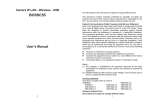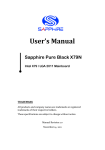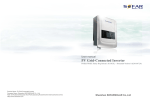Download User`s Manual
Transcript
Grand Wi-Fi Camera Pro/IP Camera Pro The information in this document is subject to change without notice. This document contains materials protected by copyright. All rights are reserved. No part of this manual may be reproduced or transmitted in any form, by any means or for purpose without express written consent. User’s Manual Federal Communications Radio Frequency Interference Statement. Note: This equipment has been tested and found to comply with the limits for a Class B digital device, Pursuant to part 15 of the FCC Rules. These limits are designed to provide reasonable protection against harmful interference when the equipment is operated in a residential installation. This equipment generates, uses and can radiate radio frequency energy and if not installed and used in accordance with the instruction manual may cause harmful interference to radio communications. However, there is no guarantee that interference will not occur in a particular installation. If this equipment does cause harmful interference to radio of television reception, which can be determined by turning the equipment off or on, the user is encouraged to try to correct the interference by one or more of the following measures: Reorient or relocate the receiving antenna. Increase the separation between the equipment and receiver. Connect the equipment into an outlet on a circuit different from that to which the receiver is connected. Consult the dealer or an experienced radio TV technician for help. Notice : (1) The changes or modifications not expressly approved by the party responsible for compliance could void the user authority to operate the equipment. (2) Shielded interface cables and AC power adapter, if any must be used in order to comply with the emission limits. CE DECLARATION This device complies with CE class B. *EN55024 EN61000-4-5 EN55022 EN61000-4-2 EN61000-4-6 EN61000-3-2 EN61000-4-3 EN61000-4-8 EN61000-3-3 EN61000-4-4 EN61000-4-11 Printed in Taiwan R.O.C. All contents are subject to change without notice. All trademarks are the property of their respective owner. 0 1 Table of the contents Chapter 1 Welcome to Wi-Fi Camera Pro/IP Camera Pro 1.1 Introduction 1.2 Product Features 1.3 System and network environment 1.4 Package Contents Chapter 2 Hardware Description and Connection 2.1 Hardware description 2.2 Quick Start: IP Camera Auto Detection 2.3 Access the IP Camera via Internet Explorer 2.4 WEB Browser Configuration 2.5 IP Address Configuration 2.6 Administrator Configuration 2.7 How to Connect to Internet with ADSL 2.8 WEB Camera (USB Camera) Configuration 2.9 Use the virtual IP to connect with Internet Chapter 3 Basic Configuration 3.1 Image control 3.2 Basic LAN configuration 3.3 Wireless Setup 3.4 Network Status 3.5 System / Client Log Chapter 4 Advance Configuration 4.1 Device administrator Setup 4.2 PPPoE Setup 4.3 Dynamic DNS Setup 4.4 FTP Service Setup 4.5 E-Mail Service Setup 4.6 NTP Timer Service Setup 4.7 User Management Chapter 5 TROUBLESHOOTING Issue:05/018/2007 Version: B P/N: 34408000 2 3 3 4 4 4 5 5 6 11 12 14 15 16 17 21 23 23 26 27 29 29 30 30 32 33 34 35 36 37 38 CHAPTER 1 Welcome to Wi-Fi Camera Pro/IP Camera Pro 1.1 Introduction Today, more people are aware of their personal, home and office security and are finding solutions to protect themselves. Our Wi-Fi Camera Pro provides the ideal solution by operating easily with your Internet Explorer web browser. Wi-Fi Camera Pro has a built-in high-speed image and network processor, providing you with a powerful embedded device with many Internet services such as Email, FTP, DDNS, PPPoE, NTP, User Manager, and Image Control. The Wi-Fi Camera Pro includes a high quality CMOS sensor with 6 infrared LEDs that provide excellent imaging in dark and low light situations. 3 1.2 Product Features 1. High Resolution Image Processor (640*480/320x240/176*144) with built-in MJPEG encoder. 2. Ethernet RJ-45,10/100 Base-T with auto-sensing. 3. Remote view through the IE browser:Suitable for most web browser (windows 2000/ XP & Linux OS). 4. Supports Free Video function:Login password is optional. 5. 6 infrared LEDs provide imaging in the dark (Night Version only). 6. Many Valuable Internet services: Email, FTP, PPPoE, Dynamic DNS, UPnP, NTP service, User Management, and Image quality Control. 7. USB 1.1 Interface making it useful as a web cam. 8. Compatible with Microsoft MSN Messenger and NetMeeting. 9. 802.11g wireless:Compatible with 802.11b Access Point (Wi-Fi Camera Pro only). 1.3 System and network environment 1. LAN: 10Base-T Ethernet or 100Base TX Fast Ethernet. 2. More than one fixed IP address is recommended. 3. A 10/100Base-T switch HUB is required. 4. Microsoft Internet Explorer 5.0 or above. 5. Pentium III 1G CPU or above. 6. 64MB RAM or above. 7. VGA card with 8MB Memory or above (800x600 or above). 8. Windows 2000/XP is recommended. Important: A fixed IP address is not required to access camera from the Internet. However if your IP address is dynamic, you need to ask your Internet service provider for the Dynamic DNS service. 1.4 Package Contents 1. Wi-Fi Camera Pro or IP camera Pro 2. Mount 3. Quick start 4. Driver CD (Surveillance software is optional) 5. USB Cable 6. RJ-45 Cable (cross over wire) 7. Switching Adapter, DC 5V/2A (-) ( ● (+) 4 CHAPTER 2 Hardware Description and Connection 2.1 Hardware description 1. Camera switch: Change the mode between PC Camera (USB),IP Camera Pro and Wi-Fi Camera Pro 2. Connections and Interface: USB 1.1, RJ45 and Power adapter 3. Reset and Default: a. Reset: When you change the mode between PC Cam, IP Camera ,Wi-Fi Camera or set the Camera, you must reset (reboot) the system. b. If you forget the IP address or ID Password, you can restore the original default parameters. c. Default IP address: http://192.168.1.100. Default User ID: root , Default User Password: admin 4. Connections and Interface: USB 1.1, RJ45 and Power adapter 5. A Ready LED: In IP or Wi-Fi Camera mode, when the ready LED is on (takes about 30 ~ 40 seconds to light) then the IP Camera can be operated. 5: 6 infrared LEDs with night-vision lens 6.The indicator LED: a. Link LED : When IP Camera is connected to the network, this light will be turned on b. 10/100 T Base LED: Indicates the network status, as well as indicating whether the connection is high speed or not. 5 2.2 Quick Start: IP Camera Auto Detection Please connect the IP Camera with your Gateway or Ethernet Hub. The Step2: Execute the software “IPCam Setup.exe” on the Desktop, then press “ Find IP Cam “ following figure suggests the recommended set-up: Step3: Select “ MAC “ then will show the IP status. Step1: Please Install the IP Auto Detect Tool (Only supports WinXP and Win2000). 6 7 Step4: Find the Internet Camera by highlighting it in the “IPCam List” and Step6 Type the command “ipconfig” to get the network information assign the IP address by clicking the button “Setting” Then you must follow the next steps to get Network information (Sub Net, Net Mask and Default Gateway Address): Step5: Click Start->All Programs->Accessories->Command Prompt Step7: Then you can assign the IP Address, Subnet Mask(NET Mask) and Default Gateway (Gate Way) to the IP Camera Step8: You must use the same Subnet Mask” 255.255.255.0 “and GateWay”192.168.2.254” Step9: You can use any IP Address between 192.168.2.1-254, but please make sure that the IP Address has never been used or is being used by any other IP addressable device. Step10: For Example: Type the following parameters and click “setting” 8 9 Step11 Click the button “ Setting ”, and “ Show IP Cam “then you can connect to Camera 2.3 Access the IP Camera via Internet Explorer Default IP Camera’s IP address is 192.168.1.100. To open IP Camera’s Home page, please type the http://192.168.1.100 then click the ”Enter” button on your keyboard. Then Login with User name: root, Password: admin. Login Screen Default User Name: root Default Password: admin Default IP address: 192.168.1.100 If it can’t get connected, then you have to modify your network setting. The IP Camera can be used to manually configure the camera’s network settings. Please use command “Ping” (Appendix A) to check the connection for more detail. Important: If you forget the IP address or ID Password, please click the “Default” button(Appendix D) on the body of IP Camera until the ready light has been turned off. 10 11 2.4 WEB Browser Configuration 1. From any PC on the local network, start Internet Explorer and enter the camera’s IP address in the address bar, as pictured below: IP Camera’s IP Address in Internet Explorer 2. When accessing the web server for the first time, you will need to install an ActiveX component for your Internet Explorer. This can be changed in your Internet Explorer Security. Internet Explorer Security Setting: (Appendix B) Step1 : Click “Tool” => “Internet Options” => “Security” => “Custom Level”. Internet Explorer Security Modify Step2 : Then, please click “Custom Level” and set the parameters as follows: ActiveX Security Settings Internet Explorer Internet Options 12 13 3. Please remember these two features must be active “Download unsigned ActiveX controls” and “Initialize and script controls not marked as safe” If you want to learn more, please refer to the troubleshooting section In Chapter 5 : Frequency Ask Questions. 2.6 Administrator Configuration Click Device Admin to Link to the Page: http://192.168.1.100/Eng/Admin.htm 4. Snapshot E-mail: Send the Live Video Screen capture via E-mail, please refer to the settings about [Configuration] => [Advanced Configuration] => [E-mail service Setup]. 2.5 IP Address Configuration: Please click Basic Setup to Link to the Page: http://192.168.1.100/Eng/BasicSetup.htm Depending on your network setup, you should see the following figures: If there is a fixed IP Address: please set the following parameters (including Subnet Mask, Gateway IP Address, Domain Name Service), about the detail, you can ask for more information from your Broadband/Cable Internet Service Provider. Important: We use the same default Password with each IP Camera, so we suggest that you change the password. Important: Each IP Camera has his own unique Mac Address, so we suggest you do not change the item ”MAC Address”. 14 15 2.7 How to Connect to Internet with ADSL 2.8 WEB Camera (USB Camera) Configuration Step1 : Install the USB driver on the software CD and click ”SETUP.EXE” If you want to connect the IP Camera with Internet and Ethernet at the same time, you must use the function “ADSL PPPoE” Step1 : Link to this page: http://192.168.1.100/Eng/BasicSetup.htm, and select “Get an IP Address by PPPoE” Step2 : Link to http://192.168.1.100/Eng/PPPoE.htm check the enable feature and type the ID and Password for your ADSL modem 16 17 Step2 : Please click “Next” to install the USB driver Setp6 : Select “install the software automatically [Recommended]”and click “Next”. Step3 : Change the switch on the camera to the mode ”Web Camera” and reset the camera. Step4 : Connect the IP Camera directly to the computer with USB cable included. Then click the option “Install the software automatically (Recommended)” Setp5 : Select “No, not this time”and click “Next”. Setp7 : Click “Continue Anyway” Step8 : Then you can see the following message: 18 19 Step9 : Open Microsoft NetMeeting(c:\program Files\NetMeeting) or MSN Messenger, then you can control the Image with MSN Messenger or NetMeeting. 2.9: How to use the virtual IP to connect IP Camera and Internet. If your network Architecture supports the following figure, You will need to do port and local virtual IP forwarding in the firewall or gateway setup Step1 : In this Page “Device administrator Setup”, please enable the function “Multiport Defaults” and assign a port number for the IP Cam Step2 : Setup your firewall or gateway, and assign a Local Virtual IP:192.168.1.100 and open a port 8888 for the IP Cam, the 20 21 following figure is just a example, you need to ask your Internet Service Provider Chapter 3 Basic Configuration 3.1 Image control In this chapter, we will introduce some basic configuration for the WiFi Camera. Step3 : In the Remote Computer, please open the Internet Explorer, and input the IP address: http://61.30.13.40:8888 Image Control Here you’ll find the following control items: 1. Video Resolution: 176*144 / 320*240 / 640*480: Select the IP Camera output Video Resolution of your choice. The higher resolution will be clearer than the smaller, but it will occupy a larger bandwidth. 2. Background Light: Normal(indoor) / Special(Outdoor or Dark): Select the IP Camera output Video quality of your choice. The better resolutions 3. Quality: Worst / Medium / Best: Select the IP Camera output Video quality of your choice. The better resolutions will be clearer than the lowest settings, but it will occupy a larger bandwidth. 22 23 4. Auto Exposure: Enable / Disable: Switch the IP Camera Auto Exposure function between Enable / Disable. By enabling it, the IP Camera will automatically modulate the lighting conditions. 5. Auto White Balance: Enable / Disable: Switch the IP Camera Auto White Balance function between Enable / Disable. By enabling it, the IP Camera will automatically modulate white color for optimal picture quality in any lighting condition. 8. Mirror: Adjust the light frequency to suit your country. 60Hz is the standard for the USA and 50Hz is the European standard. 9. Rotate: Adjust the light frequency to suit your country. 60Hz is the standard for the USA and 50Hz is the European standard. NOTE: After adjusting these parameters, please click the ”Apply” button to save your new settings. If you don’t want to keep the new settings, click the “Undo” button to give up those modifications. 6. Sharpness: Switch the IP Camera Auto White Balance function between Enable / Disable. By enabling it, the IP Camera will automatically modulate white color for optimal picture quality in any lighting condition. 7. Hue / Brightness / Contrast / Saturation: Modulate the IP Camera’s Image performance. NOTE: In the dark, we suggest you raise the “brightness”. 7. Light Frequency: Adjust the light frequency to suit your country. 60Hz is the standard for the USA and 50Hz is the European standard. 24 25 other Network devices. 3.2 Basic LAN configuration 6. Subnet Mask Address: Default Subnet Mask Address is: 255.255.255.0 7. Default Gateway IP Address: Depends on your Internet Service Provider. Please contact them for further assistance. IP Camera Setting – Basic LAN Setup 8~10. Domain Name Server: Your Internet Service provider will provide you with at least one DNS IP Address. 1. Host Name & Domain Name: If you do not know this one, you can ignore this item 3.3 Wireless Setup 2. MAC Address: Shows the current MAC address used by the IP Camera. 3. Get an IP address by PPPoE: If “Get an IP Address by PPPoE” is selected, you must setup the PPPoE configuration. (In order to login to the ADSL Modem). 4. Get an IP address by DHCP: If your Network is defined with DHCP assigning the IP address. Then you won’t need to assign the IP address by yourself manually. Wireless LAN Setup 5. Specify an IP address: Please specify your IP Camera II’s IP address by manually assigning one yourself. Don’t assign the same IP address as 26 Note:This function only used by Wi-Fi Camera Pro. 27 1. Wireless opmode: Ad Hoc / Infrastructure: Switch the Wi-Fi Camera wireless mode between the Ad Hoc mode (point to point), or Infrastructure mode (Broadcast). 3.4 Network Status Shows the current Ethernet information, we suggest the following figure: Ad Hoc : If you want to connect the Wi-Fi camera and PC or notebook directly, please select this mode. But you must make sure your notebook includes the Wireless LAN Card (802.11b/g) and you must set the parameter for 802.11b/g and Ad Hoc. Infrastructure: If there is a wireless AP ( Access Point), please select this mode. 2. SSID: SSID works best with the User ID which is used by the WLAN. 3. Encryption Type : Switch Encryption Type. Network Status 3.5 System / Client Log 6. Key: Assign WEP digital Number Key. The digital numbers must the same as the WEP Key which was used by the Wireless AP (Access Point). System / Client Log 7. IP setup: you can use the same parameter, prefers the Basic Setup 28 Shows the System / Client Logs, please click the “Reload” button to load the newest logs. Displays the details of the [Client Login Time] [IP address] [MAC Address] information. 29 Chapter 4 Advance Configuration This chapter introduces you to the advanced configuration. 4.1 Device administrator Setup Please use the MAC address which was printed in the case. 3. Reset Device: Yes / No: Allows you to reset your Wi-Fi Camera and restart without losing any stored information and settings. To enable this feature, please select “Yes”, and then click the ”Apply” button. 4. Factory Defaults: Yes / No: Allows you to reset your Wi-Fi Camera and restart with factory default information and settings. All stored information and settings will clear. To enable, please select “Yes”, and then click the “Apply” button. It is the same with the Hardware factory reset. 5. Multiport Defaults: Yes / No: Check “Enable” to allow you to configure the broadband router from WAN side. To access the setting page from external side, enter ”http://<WAN IP Address>: 8080” in the web browser Administrator Setup 1. Administrator Password: Allows you to modify the Administrator’s login password. Remember to click the “Apply” button to update and save. 6. Video with password: Yes / No: Check “Enable” to allow you to have password function. Default User ID: root Default User Password: admin Caution: Please remember your Administrator password. If forget your administrator password, please refer to chapter5 Q/A. 2. MAC Address: Allows you to modify the WiFi Camera’s MAC address. Please input the unique MAC address.(refer to Chapter 2.6). Then click the “Apply” button to update the setting. 30 31 4.3 Dynamic DNS Setup NOTE: You will have to contact your Internet Service Provider (ISP) to activate a Dynamic DNS program. 4.2 PPPoE Setup IP Camera Setting – PPPoE Setup IP Camera Setting – Dynamic DNS Setup 1. PPPoE: Enable / Disable: Click “Enable” to enable the PPPoE function. Then you can connect the IP Camera with an ADSL modem. 1. Dynamic DNS: Enable / Disable (Not Update): Select “Enable” or “Disable (Not Update)” to use or not to use the Dynamic DNS mechanism. The ISP will dynamically allocate an IP address to your router, if you dial up to Internet by ADSL/Cable modem. If you want the dynamic IP address to map to a static Domain Name, you can set the Dynamic DNS Settings by enabling this feature. 2. User Name / Password: Input PPPoE User Name and Password for automatic login PPPoE then click “Apply” button to update. 2. Domain Name: Input a domain name in this field you want to map to the IP address of your broadband/cable router. 3. PPPoE Management: Shows current PPPoE status. 3. User Name: Input the “Web Address” of your Dynamic DNS Service 4. Password: Input a password to access the dynamic DNS. 5. Server: Input the server address to access the dynamic DNS server. 32 33 4.5 E-Mail Service Setup 4.4 FTP Service Setup IP Camera Setting – E-Mail Service Setup IP Camera Setting – FTP Service Setup 1. FTP service: Enable / Disable: Select “Enable” or “Disable” to use or not use image capturing for uploading to an FTP server. The WiFi Camera will automatically capture the image and upload to an FTP Server 1. E-Mail service: Enable / Disable: Select “Enable” or “Disable” to use or not use image capturing to be sent via E-mail service. 2. Mail Server: Input your mail server to send this e-mail (POP3 Server) 3. Sender’s Address: Input the e-Mail address to send this e-Mail. 2. Server URL: Define the upload FTP URL address. (Without the path of the FTP server) 4. E-mail address To: Enter the e-Mail address to receive this e-Mail. 3. User & Password: The user name and the password to login to the FTP server. 5. Subject: Enter the E-mail Subject for the mail receiver recognize. 4. Remote Path: The file and folder path to store those images. 6. Interval In Minute: Set the interval, the E-mail will be sent the set interval time period. 34 35 6. Apply/Cancel: After making sure all settings are correct, click the “Apply” button to store the settings. 4.6 NTP Timer Service Setup 4.7 User Management IP Camera Setting – NTP Time Service Setup 1. Enable Time Zone: Enable / Disable: Enable / Disable Time Zone reference User Account Setup 2.Time Zone: Select your local Time Zone area. It will reference the GMT location time for your WiFi Camera. Note: Time Server must be enabled to use this function. 1. Current User: List of the currently stored User Names and information. 2. Assign User: Allos you to add a new user and assign a password and Level (Guest / User / Admin). Level : There are 3 different levels you can select, Guest / User and Admin. 3. Enable Time Server: Enable / Disable: Enable / Disable reference time from the Time Server. This is allows you to set your local time zone, this feature is recommended for Internet use. 4. Time Server IP address: Input reference Time Server IP address. Enter the IP Address of the Time Server in this field. The IP address will be listed with the time server information on the web. 3. Delete User: Deletes a previously added User account. 4. Reload: Reloads the list of current registered users. 5. Current time: Displays current time. Sep 01, 2004 13:30:42 36 37 CHAPTER 5 TROUBLESHOOTING Please check the following chart for a possible solution to a problem. If you are experiencing a problem, a minor adjustment may eliminate the problem. Frequently Asked Questions IP Camera Installation Q: What username and password can I use the first time accessing the IP Camera or after a factory default reset? A: default User Name = root (all lowercase) default password = admin (all lowercase) default IP Address 192.168.1.100 Q: What should I do if I forget my username and password? A: Restore the factory default settings by pressing the DEFAULT button until the ready LED is turned off. Q: I cannot access the IP Camera from a web browser. A1: Please use the run command “Ping” (Appendix A) to check the connection, if the response shown is “Request timed out”, it may be caused by the setting of the IP Address. Please refer to chapter 2.2. A2: Check the Ethernet LED of the IP camera. It should blink green and orange lights. If not, check that both ends of the Ethernet cable are securely and properly attached.. A3: Our RJ-45 Cable is a cross over wire. Meaning this cable only can be connected with a switch Hub or connected with the IP Camera being directly connected to the computer. If you want to connect with an older Hub, please remember to use a standard RJ-45 Cable. A4: Confirm that the virtual/local IP address or port [which was used by the camera (default = 80)] has been forwarded to the camera. Please refer to your gateway / router’s user manual. Q: Internet Explorer displays the following message: “Your current security settings prohibit downloading ActiveX controls”. A1: Restore the default IE security settings (Medium) or configure the individual settings to allow downloading and scripts of signed ActiveX controls. Refer to Appendix B: Internet Explorer Security Settings for more details. default User Name = root (all lowercase) default password = admin (all lowercase) default IP Address 192.168.1.100 Q: Can the IP Camera also work behind the firewall? A: Yes, you’ll need to do perform port and local virtual IP forwarding in the setup settings of the firewall. Please refer to your firewall’s user manual or help files. 38 Q: There are no images available through the web browser? A1: The ActiveX may be disabled. Please make sure ActiveX has been enabled in the Internet Options menu. Please see Appendix B: Internet Explorer Security Settings to correctly configure your Internet Explorer. 39 Appendix A: Check the Network Connection Microsoft Windows includes various network information utilities to determine various network configurations. To determine your IP address and network settings, please follow the procedures. 1. Click on ”Start” => ”Run” and type in: cmd and then press ”ENTER” 2. Type command: ipconfig and then press ”ENTER”. 3. This will display your network card’s IP address, Subnet Mask, and Default Gateway. Please remember it, we will use it later. 4. Use the command “Ping” to get the status of the network connection, the default IP is 192.168.1.100. Please type in the same command windows: ping XXX.XXX.XXX.XXX. The XXX.XXX.XXX.XXX is your IP Camera’s IP address. For example: ping 192.168.1.100. 5. If you can see the following report, the connection is successful. Pinging 192.168.1.100 with 32 bytes of data: Appendix B: Internet Explorer Security Settings The IP Camera’s web environment Communications using both JavaScript and ActiveX control technologies. The ActiveX control must be downloaded from the camera and installed on your PC. There are four things that your Internet Explorer security settings must allow for the web page to work correctly. 1. 2. 3. 4. Download signed ActiveX controls Run ActiveX control and Plug-ins Script ActiveX controls marked safe for scripting Active Scripting (Java Scripts) All these things are enabled by the default Internet Explorer Security settings. You can restore the default settings in Internet Explorer by clicking ”Tool” => ”Internet Options” => ”Security” => ”Default Level”. Reply from 192.168.1.100: bytes=32 time<1ms TTL=128 Reply from 192.168.1.100: bytes=32 time<1ms TTL=128 Reply from 192.168.1.100: bytes=32 time<1ms TTL=128 Ping statistics for 192.168.1.100: Packets: Sent = 4, Received =4, Lost = 0 (0% loss), Approximate round trip times in mini-second: Minimum = 0ms, Maximum = 0ms, Average = 0ms 6. If there is no response on this address you’ll see Pinging 192.168.1.100 with 32 bytes of data: Request timed out. Request timed out. Request timed out. Ping statistics for 192.168.1.100: Packets: Sent = 4, Received =0, Lost = 4 (100% loss), This indicates that the connection is not successful Internet Explorer Internet Options 40 41 Appendix C: Internet Explorer display error message or crashes sometime 1. Please remove the Microsoft MSN Tool or MSN Tool Bar 2. Click start->control panel->Add or Remove Programs Internet Explorer Security Modify You can also click ”Custom Level” and set the parameter for the following settings: 3. Remove the MSN Tool Bar ActiveX Security Settings 42 43 Appendix D: Step by step to restore the default Step by step to restore the default parameter(Wi-Fi Camera and IPCamera3) Step1: Reboot the Wi-Fi Camera and wait that the indicate Ready LEDs been turned on When you need RMA or advanced technical service, please fill in this form as detailed as possible and FAX or Email it to your dealer or service representative. Product S/N: Name: TEL No.: FAX No.: E-mail address: Full Address: Other add-on cards: Step2: Even the LED had been turned on, you also need to wait 20 seconds. Step3: After 20 seconds, you can start to push the Default bottom until the “READY” LED been turned off Problem description: Default IP address: 192.168.1.100 Default User Name: root Default Password: admin 44 45






































